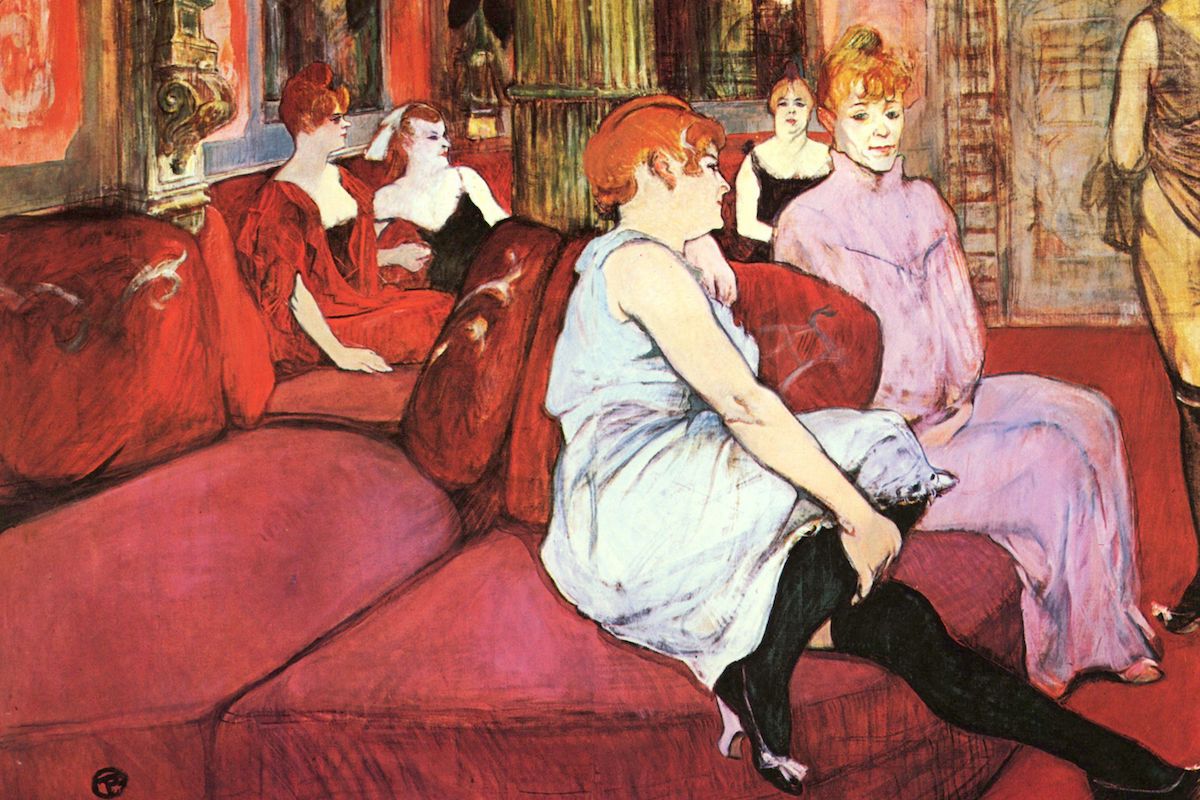Recommended
A Modest Defence of the Missionary Position
The irony is that what we often consider the most boring, the most quotidian, the most comically old-fashioned, and unremarkably ordinary way to have sex with another is also the way we encounter our deepest selves because we transcend ourselves to find union with another.

In our culture of sexual permissiveness, of free and open pornography, it might do well to occasionally remind ourselves that the missionary position remains the go-to for the vast majority of us. At a time when sexuality and gender are being hotly debated in the media, across campuses, high schools, and even primary schools (my grade three daughter recently expressed anxiety about feeling pressured to decide whether or not she was bi, or rather “B. I.,” as she called it), we sometimes forget that sex is also about actually having it. And for most of us, having it means that we’re going to be in the very ordinary missionary position, at least for a good portion of the time.
It’s true that vanilla is rarely anyone’s favourite flavour, but nobody dislikes it. There is of course much to be said for all the other flavours. But there is something comfortable, something honest and homely about vanilla. Comfort food. As a woman, this is especially meaningful to me. In the post-#MeToo, third wave feminist climate, it often feels as though, in order to be an ethical progressive women, I need to search out and identify aspects of our society that are sexist, oppressive, unfair. Much of this takes the form of critiquing tradition, which we view as largely inhibitive and repressive. Pointing out oppression, raising consciousness, is women’s strategy for getting out from under the patriarchy. “The Future is Female” signals that it’s our turn to be on top.

In this light, the missionary position might be read as an instance of masculine oppression—and sometimes it is. Women are literally pressed, after all, underneath the weight of masculine will and power. In her magisterial work The Second Sex, Simone de Beauvoir, one of the matriarchs of modern feminism, describes, somewhat alarmingly, all penetrative sex as “a kind of rape.” “The bed,” she writes, “has always been accepted as a ‘service’ for a woman for which the male thanks her with gifts or guarantees of her keep: but to serve is to give herself up to a master; there is no reciprocity at all in this relationship.” Just close your eyes and think of England, as the saying goes. The attitude expressed by Beauvoir here is now embedded not only in radical feminism, but in mainstream culture and media. A visit to Wikipedia will tell you that the missionary position is a bad idea for losing your virginity. “You cannot do anything but lay [sic] there and take it.” This echoes Beauvoir herself: “It is he who has the aggressive role and she who submits to his embrace.” The woman’s position, she writes, “leaves the male means to relieve himself on a body that his muscular force permits him to reduce to his mercy. Since she is object, her inertia does not profoundly alter her natural role: to the extent that many men are not interested in whether the woman who shares their bed wants coitus or only submits to it.” Man on top. Aggressive. Powerful. Conquering. Possessing.
If we believe these things about human sexuality and about the way we so often experience it, we might want to consider the behaviour of bonobo monkeys, the only other primates to regularly use the missionary position. The bonobos are a matriarchal species—the only matriarchal primate species, including us sapiens. They are also an uncommonly peaceful primate species (again, including sapiens). This doesn’t mean that they don’t have violent conflict. They are primates, after all! But they do have less of it than the rest of us. And their sexual intimacy is, it seems, linked to their relatively low rates of violence. This shouldn’t surprise us if we think of the missionary position not as something oppressive or without reciprocity, but as the posture that lends itself to the most reciprocity because of its unique face-to-face nature. It’s the position that has the most potential for eye contact, for intimate connection, for joy as well as pleasure.
Sex, for the most part, is supposed to feel nice enough while it’s happening. But a part of the enjoyment of it, even a very large part, is the sweetness in remembering these intimate encounters. The secret pleasure of recollecting a moment of tenderness with a sexual partner is its own kind of eroticism. If one can call to mind a loving caress, a glance of intimacy, then the sexual act takes on more significance than an instinctual—compulsive or ruthless—quest for pleasure or for conquest. Even with a new partner, it’s in those face-to-face encounters where moments of connectedness happen, the moments when passion is deepened into something of a more tender nature, and can transform sex into something of immense value because its memory holds enduring erotic pleasure.
Early psychologists such as Sigmund Freud and his pupil, Wilhelm Stekel, relay stories of sexual neurosis in women, the compulsive repetition and reliving of traumatic sexual encounters, most of which involve women who are unable to cope with feelings of guilt or of regret surrounding sexual encounters rather than with outright sexual trauma because of rape or assault. Stekel describes women who psychologically repeat the ecstasy of their first sexual encounters, and then experience debilitating shame, crying fits, and phobias. These are not happy memories. While the extreme cases of female sexual neuroses that Stekel’s research outlines seem to be less common in our more permissive age, this does not suggest that women have stopped experiencing sex as a psychologically traumatic event.

Kate Julian’s recent essay for the Atlantic, “Why Are Young People Having So Little Sex?,” arrives at many of same conclusions as Stekel’s early twentieth century research. Memories of the experience of sex are often forgettable at best, at worst, traumatic. A hookup rarely leads to great sex. It’s usually awkward or, what is hardly better than awkward, mechanical. Yet even awkward sex is preferable to painfully awkward sex. Largely because of the ubiquity of pornography, more and more initial sexual encounters involve things that are commonplace online, but less common for us everyday folks. In Stekel’s research, we read of young women surprised by the very basics of the sexual act itself, the feel, even the sight, of a penis caused confusion and trauma; today, young women are often surprised by things that figure predominantly in porn: choking, for instance, or anal penetration. Recollecting a physically painful or unexpectedly degrading experience isn’t likely to inspire great affection for sex, or for the people one has it with. We shouldn’t be surprised, then, about the current sex recession. Young people, Julian writes, decide to abstain from sex and dating “as if they were taking a sabbatical from an unfulfilling job.” One of the young women Julian interviewed, a 33 year-old who is constantly disappointed by the dating world says, “ ‘I want good sex.’ Or at least, she added, ‘pretty good sex.’”
I am not against people having casual sex. This isn’t an essay on prudery or on morals. I am against people having bad sex. Perhaps it is more accurate to say I find something immoral in having unhappy, joyless sex. Life is hard, and comically short. There is a kind of moral imperative for us to take seriously one of the greatest joys about being human. To do otherwise is a form of squandering the unlikeliness of our own existence. Erotic joy is not something we should take lightly, certainly the serious-minded poets did not. Shakespeare was never one to shy away from representing lust or aggression or the manipulation of sexual power, but he consistently holds romantic sexual love in high esteem—perhaps the highest; the union from which all social order flows. Shakespeare’s contemporary, John Donne, though he became Dean of St. Paul’s Cathedral in London and one of England’s greatest theologians, never left off writing love poetry; it was as serious to him as were the ideas of justice, grace, and redemption. Our erotic nature is the very foundation of human civilization, which is grounded in the bonds of affection and mutual care that result from the promptings of our sexual instincts combined with deeper emotions of love, self-giving, esteem, and friendship. If we view sex as the fulfillment of our natural instincts, then we really have no grounds to take offence at sexual harassment, or even sexual violence, since it would simply and unashamedly be the expression of male animal sexual aggression. It is rightly unthinkable to define our sexual nature as wholly instinctive. To do so would puts us at the mercy of appetite and invites brutality.

In her discussion of female heterosexuality, Beauvoir begins her analysis of sex from a place of resistance, but she concludes with a much more subtle understanding of female sexuality—throughout her work, Beauvoir demonstrates her brilliance when she describes women as they are, not as how she wishes them to be. Sexual pleasure for the women, she writes, “is a kind of spell; it demands total abandon.” For a woman, this means abandoning herself to her desires. This is complex for women because the deepest female desire is for a man to see her as the object of his desire; she desires to be desired. A man’s will must assert itself in order to have the flesh he covets. But a woman’s desire is to abandon her self, her subjectivity, to be viewed as an object by the man without losing herself in the process. It is a tricky business for a woman to abandon herself in the arms of a man; there is a danger that she won’t be respected and won’t be restored undamaged. To mitigate this risk, we often treat sex as just bodily pleasure, individual gratification. But protection of oneself comes at the cost of a calculating self-interest, a sexual ruthlessness that is masculine in its aggressive search for conquest and pleasure. This might often lend itself to “not bad” sex, but probably does little to inspire erotic memories of good sex.
What I’m speaking of here, as a key component to women’s sexuality, is feminine submission. I realize that in our culture the idea of positive female submission is anathema among correct-thinking progressives. This is of course largely because insecure men have taken advantage of women, and women have often been socialized into meek agreeableness at the cost of self-expression and agency. Because it can go so easily wrong, submission is a great risk. And it is true that it often ends in pain, which leads to cynicism. But this is exactly why it requires fortitude and courage to accomplish.
The risk inherent in submission is also perhaps why we so often don’t expect it of ourselves, or why we rationalize it as an unattractive posture; it’s hard, and frightening. Biologically and historically women have always paid a high price for sex: we’re at risk for more sexual violence, more serious effects of diseases, not to mention unwanted pregnancies. Historically, sex for women was thought of as dangerous, and for good reason! A woman had to be cautious about to whom she gave herself. The emancipation from motherhood and reliable ways to protect ourselves from diseases have allowed women to enjoy casual sex in ways that were unthinkable in previous centuries. We’ve made sex “fair.” Yet risk-free, guilt-free sex has often come at the cost of good sex precisely because we no longer taste the exposure to another, the vulnerability, the existential hazard of giving ourselves wholeheartedly to our desire to give ourselves away. “Safe sex.” How boring!
Only rarely does a casual hookup lend itself to a sexual encounter worth remembering with a secret smile and a happy shiver. It is in trusting, loving relationships where a woman feels free to submit to her desire for submission that she discovers new depths of herself precisely because she surpasses the limits of her own will. Men discover new depths of themselves when they feel that the fulfillment of their will occurs through the women; the man too must surpass the limit of himself in order to satiate his desire by finding its end in another, in her. His aggression finds its denouement in her yielding. For him she is the call and the response. For her he is the one who makes her feel, in a sense, universal, most like a woman, when she lets go of herself and experiences his urgency as part of her body; most like a woman when she abandons herself to her own self-giving eroticism. She is on top and at bottom at once.
It’s no wonder that the ancients spoke of sex as the mystery of one flesh—or rather, it is exactly that: a wonder. A woman must consent to give herself to a man, just as the man must feel the submission of the woman as an act of generosity that allows him to experience the release of his own sexual energy, his own active virility. This is both a universal and deeply personal experience, an elemental encounter with something profoundly, simply, comfortably, ordinarily human. When it goes wrong, it goes awfully wrong. When it goes right, it’s one of the sweetest parts about being alive. When it goes right, one recognizes oneself as the other in the sexual act itself. The man reciprocates the soft smile of a woman with his own tenderness; the women feels the man’s power as her own power. The differences felt between the sexes are seen not as a battle, not as a frustration or as a competition, not as an inconvenience to self-actualization and agency, nor as sexual androgyny, but as the very foundation of human harmony and civilization, nature’s way of revealing herself within ourselves.
“She’s all states, and all princess, I. / Nothing else is.” The opening two lines to the final stanza of Donne’s poem “The Sun Rising” are perfectly balanced in their meter and meaning. The female position comes first, the male position is the response. She is the state; he the ruler. A feminist reading might be tempted to criticize these lines as yet another instance of patriarchal control of women, but to do this would be to do nothing more than pervert the poet’s honest declaration of wonder in sexual union into something resentful, petty, and self-serving. It would reveal the reader’s own emotional meanness, not the poem’s beauty. The setting of Donne’s short poem is immensely private: two lovers within their bedcurtains as the morning sun peeps in through the window. Yet Donne makes this moment political, this is the foundation of human organization, of states, of rulers, of civilization. And then he makes it universal by connecting it to the sun and the cosmos: “Shine here to us, and thou art everywhere, / This bed thy center is, these walls, thy sphere.” The lovers in the poem feel as though they’ve become the center of the universe, a feeling shared universally by all lovers everywhere.
“The ancients,” writes Camus in The Rebel, “even though they believed in destiny, believed primarily in nature, in which they participated in wholeheartedly. To rebel against nature amounted to rebelling against oneself. It is butting one’s head against a wall.” There is a kind of tragic heroism in rebellion. And a kind of deeply human beauty in it—rebellion, too, seems to be our nature. But there is also a uniquely human courage in participating in nature wholeheartedly, with abandon. The irony is that what we often consider the most boring, the most quotidian, the most comically old-fashioned, and unremarkably ordinary way to have sex with another is also the way we encounter our deepest selves because we transcend ourselves to find union with another.







